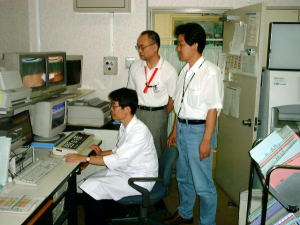Over the Years
Home > Over the Years > Over the Fiscal Years (2000 APR - 2010 MAR) > Invited a medical doctor for the training from Korea
Invited a medical doctor for the training from Korea
Name and Position:
Sang-Mo Yun
Assistant Professor, Department of Radiation Oncology,
Yeungnam University Medical Center, Korea
Period:
Host Organization:
Training Course:

Training Scene
Dr. Yun’s Impressions:
Having never lived away from my family for a long period before, I was a touch uncertain about my stay in Hiroshima. However, the moment I left Hiroshima port, seeing a sign written in Korean and welcoming me to Hiroshima, I felt great warmth.
With Saturday and Sunday preceding the start of research, I was able to take a short break. Although managing my own meals was difficult, thanks to the superintendent of the mansion, as well as the kind clerks at the supermarket, I managed to get by rather well.
The HICARE training started on July 5th, 2004, at the Hiroshima University Research Institute for Radiation Biology and Medicine (RIRBM). I found it quite surprising that, from this rather old building, quite a number of important research articles had been produced. Also, I was particularly impressed by Mr. Matsuura’s passion towards his research experiments. Up until now, I have only had the opportunity to read other researcher’s publications, having never actually participated. I consider this experience, being able to see the experimental process behind the many research articles, to be precious. Furthermore, I was very kindly attended to in the laboratory; it almost felt like home in Korea.
From July 19th, 2004, I started training at the Radiation Oncology Department of Hiroshima University Hospital in addition to the RIRBM. Although some of the equipment being utilized was older than what I am accustomed to, the enthusiasm of the researchers was quite impressive.
After one month of training, the time drew near to conclude my studies and return to Korea. Particularly in the medical fields, although one month is a short period of time for learning anything concrete, it was a valuable time of many new experiences.
To conclude, I would like to extend my deep appreciation to Professor Katsuhide Ito and staff of the Radiation Oncology Department of Hiroshima University Hospital, as well as all the staff concerned at RIRBM. I also would like to thank HICARE for their invitation and sincere support during my stay in Hiroshima.
July 30, 2004




